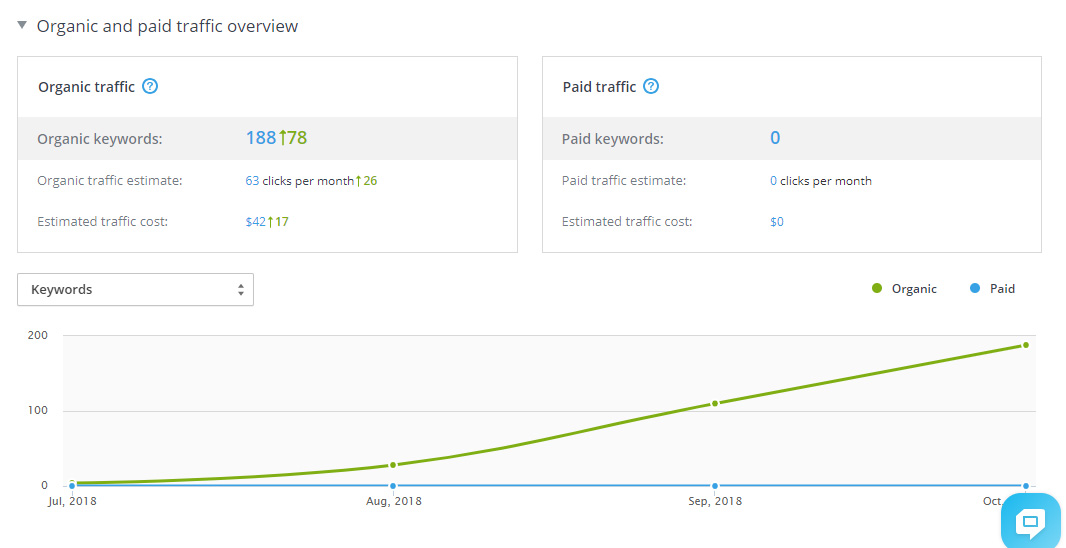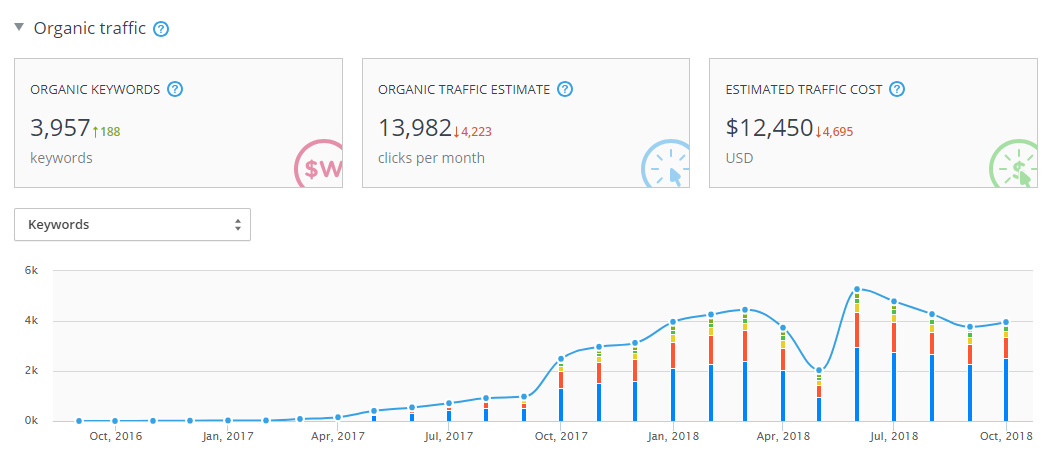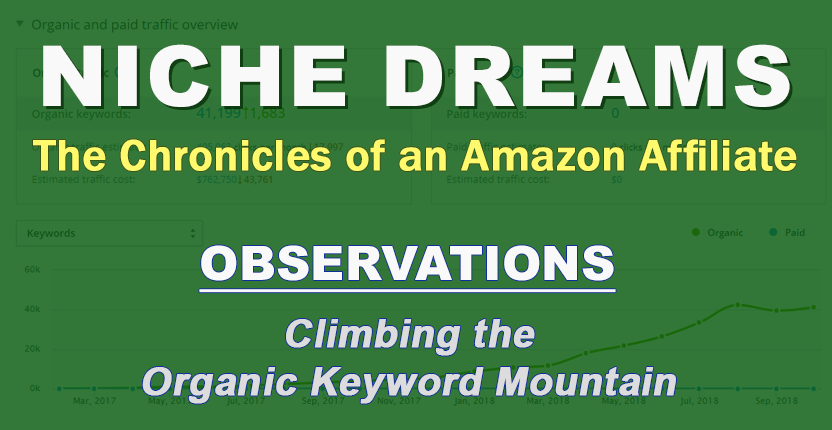Anyone who is building an affiliate niche website is probably looking to rank it quickly in Google. I’ve noticed that there is a large divide between people who believe that content is more important than link building for ranking. Some will swear that pumping out high-quality content as quick as possible with zero link building is better than much fewer posts/articles with high authority backlinks. My belief is to try and find a middle ground.
When I first built my niche website, my goal was to create an informational hub page that was 1500+ words. This page would not contain any affiliate links or call-to-action boxes. The only links on the page are source links to back up my claims AND internal links to larger 2000+ word affiliate product review pages.
Looking at the data for the past 30 days in Google Analytics, this hub page is the 2nd most visited. As expected the home page gets the most traffic. However, the traffic that resulted in the info page ranking 2nd is mostly due to a referral link from a Disqus comment. When looking at organic traffic from Google this page drops all the way to 12th most visited.
Is this upsetting to me? Not really. The targeted keyword has a volume of roughly 12,000 monthly searches. 7 of the 8 internally linked affiliate pages get more traffic from Google than that page. Their keyword volumes range from 20 to 4,400 monthly searches. Which one gets the most organic traffic and has been the highest converting page for Amazon sales? The page that has a targeted keyword volume of 140 with 52 unique visitors. It ranks #4 in the Google SERPs. I guess it could be called a 2-word long tail keyword, which leaves open many possibilities for phrase searches.
Forming a strategy based on short-phrase keywords
I honestly don’t believe that my #1 converting page would be ranked that high without the trickle-down link juice power from that hub page AND my scholarship page. This scholarship page also has the 8 linked affiliate pages. As of today, there are 13 inbound links from different universities and colleges pointing to the scholarship page.
Call it a hunch, but it feels like 100-200 monthly searches is the sweet spot for ranking quickly and converting sales. I have done no link building directly to this page (perhaps I’ll revisit that later to get #1), however, I have a nearly completed link map centered around my hub page which I’m positive is having an effect.
Take a look at the current rankings below for my low volume keywords over the last 3 days and I’ll explain why I think it’s important to balance link building and content creation.

3 of these 5 keywords rank in the top #5 position in Google.
The first and second keywords are on pages that might not be as meaty as the others, but they certainly have enough well-structured content to rank. Other than the last keyword (which ranks #1), their volumes are lower than the rest of the group. The main difference is that those last 3 are bolstered by the hub page and the scholarship page.
Implementing This Strategy on a Medium and Small Scale
I recently built another product comparison page with a keyword volume of 1,600 monthly searches. I thought that since one of my larger keyword volume pages currently ranks in the low 40’s, I would see some sort of results quickly. It’s been several days and this new page hasn’t cracked the top 200.
I’ve verified that this new page is indexed along with being linked to my scholarship page and re-indexing said scholarship page. However, I totally forgot to link it on the hub page and re-index that in Google. It’ll be interesting to see if this gives it the necessary boost to land in the top 100 results of Google. I think that the referral traffic from Disqus to the hub page is something to monitor as far as an indirect ranking factor.
Given the data above, from this point forward I’ll target that sweet spot of keyword volume in any new product comparison pages that I build. If it works, and I can consistently pump out these pages on a weekly basis, it should provide a formula for success. Although I still like to observe other Amazon affiliate websites and try to determine what tactics they are using to rank quickly.
Climbing the Organic Keyword Mountain
What the hell is an Organic Keyword Mountain? It’s my term for describing a dramatic increase in ranked keywords of a given website in a short amount of time. Usually between 1 to 2 years and in rare cases, less than a year. The steeper the mountain, the more impressive I find it.
I suppose I should have a name for websites less than 6 months old that exhibit this behavior, such as mine. It’s certainly no mountain, but perhaps a hill? Yeah, let’s go with that, organic keyword hill!
My Niche Website’s Slow But Steady Progress

The organic keyword hill of my niche website.
According to SE Ranking, my organic keywords have gone from 4 to 188 since July to October. While I’m happy with this progress, it’s still small potatoes compared to the big boy affiliates. Interestingly enough, those 188 keywords aren’t all picked up by Google Search Console. However, of the several that I’ve checked, the reported positions do match up closely with their rank in the search results.
On the flip side, there are keyword impressions recorded from Google Search Console that aren’t yet registered by SE Ranking. A few of them being notable with some clicks while most are obscure with very little impressions. Combining data from both these tools allows me to get some good insight into what keywords are performing well on certain pages.
Does this mean I should go back and keyword stuff my product comparison pages to rank higher for those terms? No, this would most likely read as forced and awkward. I believe a better way to rank for these terms would be to build sub-page link maps. They aren’t as extensive as the bigger hub page link maps but should give a decent enough of a boost in ranking to get some clicks and ultimately, conversions.
Making the Climb With Baby Steps
The rate of increase for my niche website’s monthly organic keywords isn’t significant enough to warrant the mountain label yet. I feel barely comfortable even calling it a hill. There simply hasn’t been enough time accrued and big enough of a jump to justify that distinction.
I think that if I were pumping out content at the rate of globosurfer.com or mypetneedsthat.com things would look a lot different. Although, I’m sure that each of those websites is spending a pretty penny for writers creating the content. I just don’t have that amount of money at my disposal, thus my expectations need to be realistic.
In order to achieve success for my budget I’ve been searching for affiliate websites that have:
- A moderate organic keyword mountain (0 to 3k+ in 1 year)
- A low number of indexed pages (under 200)
- A backlink profile consisting of sites that register on SimilarWeb
Lately, I’ve been focusing too much on domain metrics. Meaning websites that have a high DA/PA and TF/CF. While this is important, I think there is another factor that I’ve neglected to account for. That being, the traffic of the websites linking to an affiliate website and/or page.
In regards to item #3 in the above list, when I’m referring to a registered website on SimilarWeb, I’m talking about it actually returning a value other than “We’re Sorry But… blah blah no data”. Perhaps Google is taking the amount of traffic to a linking website into consideration as a ranking factor. Or maybe it is as simple as referral traffic being factored into the affiliate website from those linking sites. Regardless, it’s made me change my overall strategy for outreach when trying to build my own links.
Why did I come to this conclusion? Well, I discovered a newer affiliate website that fits the listed criteria above. It’s not as big as some of the others I’ve talked about in previous blog posts. However, they rank extremely well for several high volume keywords. In the next section, I’ll detail why I’ve decided to model my ranking strategy based on this discovery.
Why Traffic is the Most Important Metric of a Backlink
The affiliate website based on my traffic theory is ketogenicsupplementreviews.com. I would classify it as a super-focused niche. Instead of covering the wide spectrum of health supplements, the emphasis is solely on keto. That word, keto, is everywhere on the website. However, since it is also in the domain name, the use of this word doesn’t seem unnatural or forced.
This level of focus is not too different from how my niche website is structured. One unusual thing I’ve noticed is that the keto keyword by itself doesn’t have the largest volume of that niche. In fact it pales in comparison to the 2-word phrase keto dieting.

Keto dieting is searched 10x more than keto!
At a whopping 450k search volume, keto dieting blows away the search volume of the singular term. This type of behavior is not something I’m used to seeing at all. In fact, my main singular keyword shows the opposite in regards to its volume being significantly more than the most searched 2-word term.
Researching Ketogenic Supplement Reviews

An impressive OKM with an unusual dip.
The OKM of this example website first starts any meaningful ascension around April 2017. In May 2018 there was a huge drop in organic keywords. Approximately half of the 4,000 keywords just fell off the map. Doing some digging, I speculate that perhaps this was the result of a significant Google algorithm update during that period. However, the very next month there is a nice recovery of those keywords.
Now that you have a picture of this niche website’s OKM, let’s take a peek at the other statistics and metrics of the domain.
Domain Age: 2 Years (D.O.B. – 6/23/16)
Root Domain TF/CF: 11/17
Domain DA/PA: 35/38
Estimated Backlinks: 2.06k (Referring IPs 391)
Estimated SimilarWeb Traffic: 186K Monthly Unique Visitors
Other than the traffic, none of these statistics really WOW you. It just proves that you don’t need a website with a high Trust Flow & Citation Flow or Domain Authority & Page Authority to find success and make money through affiliate marketing.
So how was this traffic built in such a short amount of time? Obviously quickly ranking for medium and high-volume keywords will do the trick. But how was that done? I think it all comes down to a highly optimized backlink profile. Both on a site-level and on a page-by-page basis.
An Example of a Page Backlink Profile
One of the more popular pages on Ketogenic Supplement Reviews is the page ketogenicsupplementreviews.com/pruvit-keto-os/. According to SEO Review Tools Backlink Checker this particular page has backlinks from 19 different IP addresses. Although I haven’t fully investigated these backlinks, I believe there is some link stacking happening.
If you’re unfamiliar with link stacking, it is a tactic used by many SEO professionals to help build link power. Essentially, you have primary backlinks pointing to your niche website. The next tier in a link stack would be pointing to those linking posts and so forth. Usually, this process goes 3 or 4 levels deep.
For the Pruvit Keto OS page, the top 5 relevant backlinks to that page are as follows:
- healthworkscollective.com:
SimilarWeb Traffic – 21.3k Monthly Unique Visitors
Root Domain TF/CF – 18/42
Domain DA/PA – 58/33
Link Type – No-Follow - organicdailypost.com:
SimilarWeb Traffic – 144.5k Monthly Unique Visitors
Root Domain TF/CF – 27/26
Domain DA/PA – 45/28
Link Type – Follow - findhealthtips.com:
SimilarWeb Traffic – 162.8k Monthly Unique Visitors
Root Domain TF/CF – 19/29
Domain DA/PA – 49/31
Link Type – Follow - onlinemlmcommunity.com:
SimilarWeb Traffic – 99.4k Monthly Unique Visitors
Root Domain TF/CF – 5/27
Domain DA/PA – 33/21
Link Type – Follow - bristolbites.co.uk:
SimilarWeb Traffic – No Data
Root Domain TF/CF – 13/29
Domain DA/PA – 44/27
Link Type – Follow
Other than the last domain, all of the websites have a decent amount of monthly traffic. I think it is safe to assume that referral traffic is coming from those links too. For Google’s algorithm, it could be a combination of those referral clicks and the linking websites overall traffic. Whatever it is, the low authority metrics do not seem to matter.
I suspect other pages on Ketogenic Supplement Reviews have similar page backlink profiles. They all seem to be either a guest post or a sponsored post. Typical prices for those types of posts can range from free to hundreds of dollars. Spending some time on outreach may yield some affordable and quality opportunities.
Final Thoughts on Organic Keyword Mountain
It’s not a complex equation. The more organic keywords you have listed in Google, the more traffic you’ll receive. The result of this traffic should lead to some natural increases in keyword rankings. Of course, as shown above, speeding up this process through effective link map building should have the most positive and quickest impact.
Viewing your own niche website’s OKM is an excellent way to get find some long-tail keywords that aren’t registered in Google Search Console. I’m sure you’ll be pleasantly surprised at some of the rankings for those keywords. Something to try might be to include them in your guest or sponsored posts to catapult them to the top of the SERPs. This avoids stuffing them in your already built product comparison pages and creates a natural appearance.


